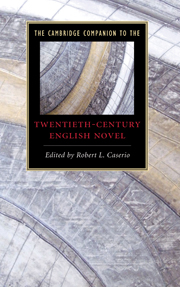Book contents
- Frontmatter
- Introduction
- 1 The art of English fiction in the twentieth century
- 2 The British Empire and the English modernist novel
- 3 Realism and rebellion in Edwardian and Georgian fiction
- 4 The Great War in English fiction
- 5 Postwar modernism in the 1920s and 1930s: The mammoth in the basement
- 6 Regionalism in English fiction between the wars
- 7 Ireland and English fiction
- 8 Feminist fiction
- 9 Working-class fiction across the century
- 10 World War II, the welfare state, and postwar “humanism”
- 11 The Windrush generation
- 12 History in fiction
- 13 Postmodernisms of English fiction
- 14 Detectives and spies
- 15 The post-consensus novel: Minority culture, multiculturalism, and transnational comparison
- 16 An absurd century: Varieties of satire
- 17 The other side of history: Fantasy, romance, horror, and science fiction
- Further reading
- Index
13 - Postmodernisms of English fiction
Published online by Cambridge University Press: 28 July 2009
- Frontmatter
- Introduction
- 1 The art of English fiction in the twentieth century
- 2 The British Empire and the English modernist novel
- 3 Realism and rebellion in Edwardian and Georgian fiction
- 4 The Great War in English fiction
- 5 Postwar modernism in the 1920s and 1930s: The mammoth in the basement
- 6 Regionalism in English fiction between the wars
- 7 Ireland and English fiction
- 8 Feminist fiction
- 9 Working-class fiction across the century
- 10 World War II, the welfare state, and postwar “humanism”
- 11 The Windrush generation
- 12 History in fiction
- 13 Postmodernisms of English fiction
- 14 Detectives and spies
- 15 The post-consensus novel: Minority culture, multiculturalism, and transnational comparison
- 16 An absurd century: Varieties of satire
- 17 The other side of history: Fantasy, romance, horror, and science fiction
- Further reading
- Index
Summary
Postmodernism is hard to define. Is it a period term, a social diagnosis, a cultural dominant, an anti-aesthetic posture, a philosophical endgame, a hollowing out of time and a new substantiation of space, a sign of political defeat? Postmodernism is all of those, its vagueness as a concept matched by its voracity as a category. The all-embracing prefix is part of the problem. Does (post)modernism, coming after modernism in the 1950s, extend or negate the earlier movement? Or does it paradoxically precede modernism conceptually, bearing witness to what modernism could not represent? These unsettled questions suggest that postmodernism is both an overdetermined heir of modernist influences and an open-ended set of practices and theories whose relationship to modernism remains vexed.
An additional difficulty arises for any assessment of the nature of postmodernist fiction in Britain when one takes American popularization of the term into account. Its early formulations by critics such as Leslie Fiedler, Irving Howe, Ihab Hassan, Gerald Graff, and Fredric Jameson referred to the post-war American intellectual scene. Whether it was Fiedler describing postmodernism's blurring of a gap between “high” and “popular” culture, Howe identifying its anti-intellectualism, Hassan defining it against modernism, Graff censuring its ethical irresponsibility, or Jameson theorizing it as a cultural dominant of late capitalism, these accounts took no cognizance of postwar British society. To say so is not to criticize their exploratory work, for British literary culture after the war appeared to observers to be austere, insular, and cautious. That such a view was one-sided has become clear, but at the time it seemed as though a full-scale reversion to premodernist literary traditions was under way. In America postmodernism signaled a paradigm shift away from modernism and towards a new episteme; in Britain the literary culture seemed determined to go back to a time before modernism had reared its ugly head.
- Type
- Chapter
- Information
- The Cambridge Companion to the Twentieth-Century English Novel , pp. 192 - 209Publisher: Cambridge University PressPrint publication year: 2009
- 4
- Cited by



